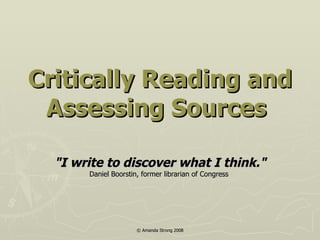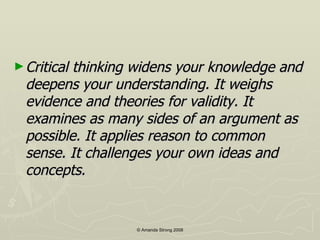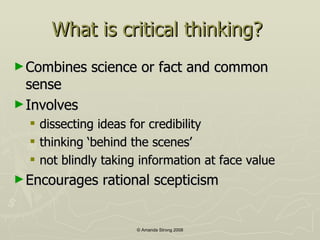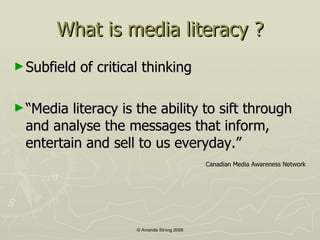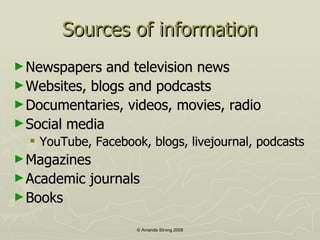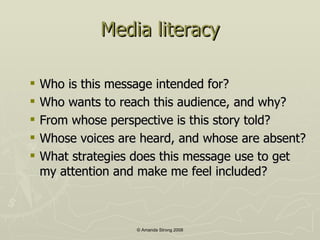Critically Reading And Assessing Sources
- 1. Critically Reading and Assessing Sources "I write to discover what I think." Daniel Boorstin, former librarian of Congress
- 2. Critical thinking widens your knowledge and deepens your understanding. It weighs evidence and theories for validity. It examines as many sides of an argument as possible. It applies reason to common sense. It challenges your own ideas and concepts.
- 3. What is critical thinking? Combines science or fact and common sense Involves dissecting ideas for credibility thinking ŌĆśbehind the scenesŌĆÖ not blindly taking information at face value Encourages rational scepticism
- 4. What is media literacy ? Subfield of critical thinking ŌĆ£ Media literacy is the ability to sift through and analyse the messages that inform, entertain and sell to us everyday.ŌĆØ Canadian Media Awareness Network
- 5. Sources of information Newspapers and television news Websites, blogs and podcasts Documentaries, videos, movies, radio Social media YouTube, Facebook, blogs, livejournal, podcasts Magazines Academic journals Books
- 6. Media literacy Who is this message intended for? Who wants to reach this audience, and why? From whose perspective is this story told? Whose voices are heard, and whose are absent? What strategies does this message use to get my attention and make me feel included?
- 7. Media literacy & critical thinking What do you mean by_______________? How did you come to that conclusion? What is the source of your information? What assumption has led you to that conclusion? Why is this issue significant? How do I know that what you are saying is true? What is an alternate explanation for this phenomenon?
- 8. Newspaper Exercise Break into groups and discuss your article What story is this article trying to tell? Why did this story made it into the news? What may have been included or left out of the story? What factors may be influencing how the story is told? Does the story show bias? How would you describe the headlines (serious, playful, shocking, literal)? What does the headline say about the story? What roles does the headline play in this story? Could the story be told a different way or from a different perspective? Is the information in the story accurate? How credible is the story?
- 9. Finding Information Library Books and encyclopedias Academic databases Journals Internet Interviews Friends Experts
- 10. Internet Good for background information Approach with caution anyone can write anything on the Internet critical thinking is key
- 11. Internet What is the purpose of the website? To inform? to sell? To entertain? To dissuade? What kind of website is it? Personal page? Commercial or business site? Educational site? Who owns/funds the website? Is it clearly disclosed? (Use whois.net) Who writes or ŌĆśgatekeepsŌĆÖ the content on the website? Are they credible? (Look at the ŌĆ£About UsŌĆØ page) Is the information current? Does it say when it was ŌĆ£last updatedŌĆØ? Is the information based on fact (and referenced) or is it an opinion? If it is an opinion, is that clear? Does the site reference print and other non-Internet sources?
- 12. Health Information The number one reason for Internet searches is health information ! Hard for most of us to evaluate Science / technical information May be emotional topic for us Not always clear when the goal is to sell A lot of health information on the Internet is to sell a product! Know purpose and sponsors before trusting information
- 13. Paid Advertising Paid Advertising GovŌĆÖt of Manitoba ŌłÜ Magazines
- 14. ╠²
- 15. Where are the references????
- 16. In-class Exercise Pick a topic and do an Internet search Assess some of the sources of information
